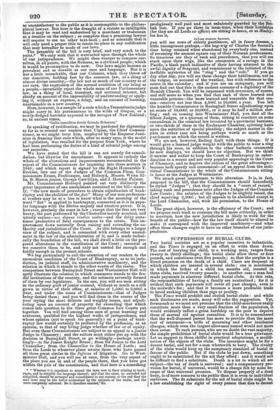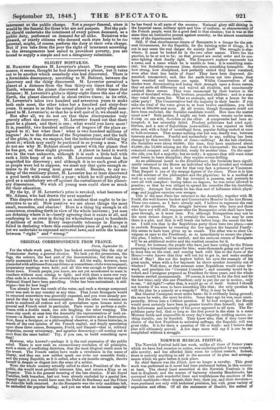SUPPRESSION OF BURIAL CLUBS.
THE burial societies act as a popular incentive to infanticide, and the Times is engaged on an effort to write them down. The cost of burying the child, to a working man, ranges from twenty to thirty shillings; the burial clubs allow three or four pounds, and sometimes even five pounds; so that the surplus is a direct premium on the death of a child. Cases are frequent in which children are insured in several clubs : one is mentioned in which the father of a child ten months old, insured in three clubs, received twenty pounds ; in another case a man had made payments in nineteen different burial clubs. At this rate, the responsibilities of having a family are neutralized ; for it is evident that such payments will cover all past charges, even to the midwife's fee; and that it becomes a more profitable trade to breed sucking children than pigs or poultry. The Times would prohibit and abolish burial clubs : and while such disclosures are made, many will echo the suggestion. Yet, forasmuch as we must not presume that the child-murderers really constitute more than a very small fraction of the population, it would evidently inflict a great hardship on the poor to deprive them of mutual aid against casualties. It is to be remembered that the well-disposed parent has more to provide than the mere cost of interment—a trifle of mourning and other incidental charges, which even the largest allowance named would not more than cover. To such persons, who are no doubt the vast majority, the simple prohibition of burial clubs would be a true grievance. Let us suggest to those skilful in practical adaptations, a modifi- cation of the objects of the clubs. The insurance might be for a decent burial, and not for a sum wherewith to bury. The rivalry of the clubs would keep up the sumptuary standard of burial in favour of the public. But if the clubs be put down, something ought to be substituted for the aid they afford : and it would not be difficult to find a substitute. Death is a lot to which all are subject—the tax of death is universal; and a compensatory pro- vision for burial, if universal, would be a charge felt by none be- cause of that universal pressure. To dispose properly of a dead body, is of more concern to the public than it is even to individual survivors. The fit substitute for the aid of burial clubs might be, a law establishing the right of every person that dies to decent interment at the public charge. Not a pauper funeral, since it would be the funeral for those who are not paupers. But the pub- lic should undertake the interment of every person deceased, as a public duty, performed on demand for all alike. Relatives who pleased, or sturdy citizens who deemed such state help to be too paternal, might, of course, perform the duty at their own charge. But if you take from the poor the right of interment according to the arrangements best suited to provident poverty, you are bound to supply a simple and not a derogatory substitute.



























 Previous page
Previous page